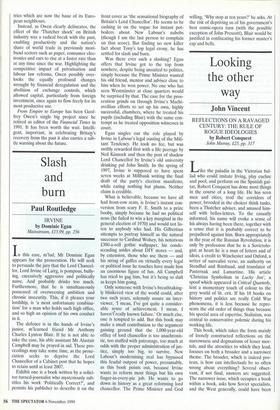Slash and burn Paul Routledge
IRVINE by Dominic Egan Mainstream, f15.99, pp. 256
In this case, m'lud, Mr Dominic Egan appears for the prosecution. He will seek to persuade the jury that the Lord Chancel- lor, Lord Irvine of Lairg, is pompous, bully- ing, excessively aggressive and politically naive. And probably drinks too much. Furthermore, that he is simultaneously possessed of overweening ambition and chronic insecurity. This, if it pleases your lordship, is 'a most unfortunate combina- tion' for a man who holds such high office, and so high an opinion of his own conduct in it.
The defence is in the hands of Irvine's junior, m'learned friend Mr Anthony Charles Lynton Blair. If he is not able to take the case, his able assistant Mr Alastair Campbell may be prayed in aid. These pro- ceedings may take some time, as the prose- cution seeks to deprive the Lord Chancellor of a Cabinet post that he hopes to retain until at least 2007.
Exhibit one is a book written by a solici- tor-turned-journalist who mysteriously sub- titles his work 'Politically Correct?', and permits his publisher to describe it on the front cover as 'the sensational biography of Britain's Lord Chancellor'. He seems to be cashing in on the vogue for instant pot- boilers about New Labour's nabobs (though I am the last person to complain on that score). But finding no new killer fact about Tony's top legal crony, he has settled for slash and burn.
Was there ever such a slashing? Egan offers that Irvine got to the top from nowhere, despite being unsuited to politics, simply because the Prime Minister wanted his old friend, mentor and adviser close to him when he won power. No one who has seen Westminster at close quarters would be surprised by that. The case for the pros- ecution grinds on through Irvine's Machi- avellian efforts to set up his own, highly successful, chambers, where he treated his pupils (including Blair) with the same con- tempt as he treated opposition witnesses in court.
Egan singles out the role played by Irvine in Labour's legal ousting of the Mili- tant Tendency. He took no fee, but was swiftly rewarded first with a life peerage by Neil Kinnock and then the post of shadow Lord Chancelloi by Irvine's old university drinking pal John Smith. In the spring of 1997, Irvine is supposed to have spent seven weeks at Millbank writing the final draft of the party's election manifesto, while eating nothing but plums. Neither claim is credible.
What is believable, because we have all had front-row seats, is Irvine's instant con- version from scary F. E. Smith to a prize booby, simply because he had no political nous (he failed to win a key marginal in the general election of 1970) and would not lis- ten to anybody who had. His Gilbertian attempts to portray himself as the natural successor to Cardinal Wolsey, his notorious £300-a-roll gothic wallpaper, his conde- scending asides about DIY stores — and, by extension, those who use them — and his string of gaffes on virtually every legal or political issue he touches have made him an enormous figure of fun. All Campbell has tried to gag him, but it's being so daft as keeps him going.
Only someone with Irvine's breathtaking- ly blinkered view of the world could, after two such years, solemnly assure an inter- viewer, 'I mean, I've got quite a consider- able sense of achievement. I mean, I haven't.really known failure.' Or much else, one is tempted to add. But this book may make a small contribution to the argument gaining ground that the 1,000-year-old office of lord chancellor is too anachronis- tic, too stuffed with patronage, too much at odds with the proper administration of jus- tice, simply too big, to survive. New Labour's modernising zeal has bypassed this feudal outpost of power, presumably, as this book points out, because Irvine wants to reform most things but his own finger-in-every-pie job. He wants to go down in history as a great reforming lord chancellor. The Prime Minister and God willing, 'Why stop at ten years?' he asks. At the risk of depriving us of his government's best comic-opera turn (with the possible exception of John Prescott), Blair would be justified in confiscating his former master's cap and bells.


























































































 Previous page
Previous page